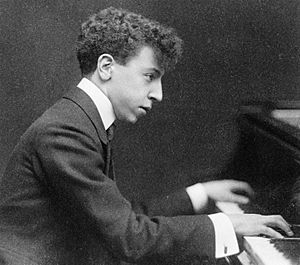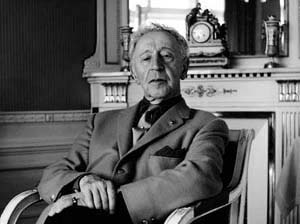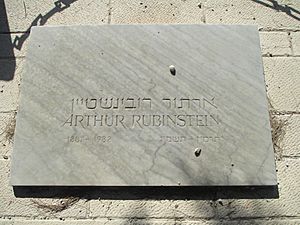Arthur Rubinstein facts for kids
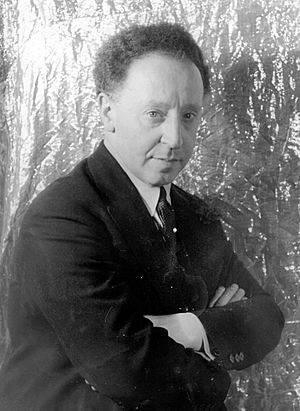
Arthur Rubinstein (Polish: Artur Rubinstein; 28 January 1887 – 20 December 1982) was a famous Polish-American pianist. Many people consider him one of the greatest pianists ever. He was known around the world for playing music by many different composers. He was also seen as one of the best at playing music by Chopin. Rubinstein performed in public for an amazing eight decades!
Contents
Early Life and Musical Beginnings
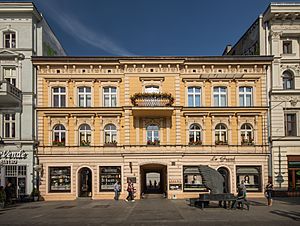
Artur Rubinstein was born in Łódź, Congress Poland (which was part of the Russian Empire at the time), on January 28, 1887. He came from a Jewish family and was the youngest of seven children. His father owned a small factory that made textiles.
Rubinstein was supposed to be named Leo. But his eight-year-old brother insisted, "His name must be Artur! Artur X (a neighbor's son) plays the violin so nicely, so the baby might also become a great musician!" So, he was named Artur. However, in English-speaking countries, he preferred to be called Arthur Rubinstein.
When he was just two years old, Rubinstein showed he had absolute pitch (meaning he could identify musical notes just by hearing them). He also loved watching his older sister's piano lessons. By age four, people already saw him as a child prodigy, someone with amazing talent at a young age. A famous Hungarian violinist named Joseph Joachim heard the four-year-old play and was very impressed. He told Arthur's family that the boy could become a very great musician. On December 14, 1894, seven-year-old Arthur Rubinstein played his first public concert.
At age ten, Rubinstein moved to Berlin to continue his music studies. He performed with the famous Berlin Philharmonic orchestra in 1900, when he was 13. His teacher, Karl Heinrich Barth, had learned from Liszt, who had learned from Czerny, who was a student of Beethoven!
Building a Music Career
In 1904, Rubinstein moved to Paris to really start his career. There, he met famous composers like Maurice Ravel and Paul Dukas. He also played a piano concerto by Camille Saint-Saëns with the composer listening!
Rubinstein made his first appearance in New York at Carnegie Hall in 1906. After that, he toured the United States, Austria, Italy, and Russia. At first, he didn't have much success in the United States. He even struggled with money and was almost kicked out of his hotel room in Berlin. In 1912, he played his first concert in London, where he found a welcoming musical community.
During World War I, Rubinstein stayed in London, giving concerts. In 1916 and 1917, he toured Spain and South America, where he became very popular. He grew to love the music of Spanish and Brazilian composers like Enrique Granados and Heitor Villa-Lobos. Rubinstein was so upset by Germany's actions during the war that he never played there again after 1914.
In 1934, Rubinstein decided to take a break from performing. He felt he had relied too much on his natural talent and not enough on practicing. So, he spent several months studying and practicing very hard.
Rubinstein toured the United States again in 1937. His career became centered there during World War II, and he became a US citizen in 1946.
Later Career and Achievements
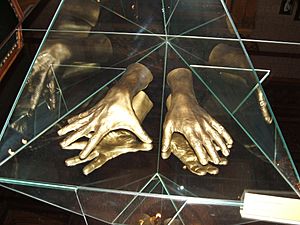
While living in California, Rubinstein played piano music for several films, including Song of Love. He also appeared as himself in movies like Carnegie Hall.
Rubinstein was best known for playing solo concerts and concertos with orchestras. But he was also an excellent chamber musician, playing with other famous musicians like Jascha Heifetz and Pablo Casals. He recorded many important piano pieces, especially those by Romantic composers. Many people believed he was the best at playing music by Chopin. He recorded almost all of Chopin's works. In 1964, during the Cold War, he gave a famous concert in Moscow, playing only Chopin's music.
In 1969, a film about his life, Arthur Rubinstein – The Love of Life, won an Academy Award for Best Documentary.
By the mid-1970s, Rubinstein's eyesight started to get worse. He retired from performing at age 89 in May 1976. His last concert was at London's Wigmore Hall, where he had first played almost 70 years earlier.
Rubinstein could speak eight languages and remembered a huge amount of music. He once said he learned a whole symphony while on a train, without a piano, just by practicing the parts in his lap! He had an amazing memory, almost like a photograph. He could even "see" a coffee stain on the page while remembering a musical score.
Rubinstein also had incredible hearing. He could play entire symphonies in his mind. He said, "At breakfast, I might pass a Brahms symphony in my head. Then I am called to the phone, and half an hour later I find it's been going on all the time and I'm in the third movement."
Rubinstein wrote two autobiographies: My Young Years (1973) and My Many Years (1980).
Personal Life and Beliefs
Family Life
In 1932, at age 45, Rubinstein married Nela Młynarska, a 24-year-old Polish ballerina. Nela was the daughter of a Polish conductor. They had five children, though one died very young. Their children include the photographer Eva Rubinstein and the actor John Rubinstein. Nela later wrote Nela's Cookbook, which featured dishes she made for their famous parties.
Jewish and Polish Identity
Rubinstein was proud of his Jewish background. He was a great friend of Israel and visited many times, giving concerts and master classes.
In 1949, Rubinstein and other famous musicians said they would not perform with the Chicago Symphony if it hired a conductor who had stayed in Germany during World War II and performed for Hitler. This showed his strong feelings about the Holocaust, which had affected his own family.
Rubinstein was also very connected to Poland throughout his life. At the opening of the United Nations in 1945, he showed his Polish pride. He was disappointed that Poland did not have a group of representatives there. Rubinstein stopped his concert, asked everyone to stand up, and then played the Polish national anthem loudly and proudly. The audience gave him a huge cheer.
Giving Back
Rubinstein supported many charities. He often performed concerts to raise money for different organizations. For example, in 1961, he gave ten concerts at Carnegie Hall to raise about $100,000 for groups like Big Brothers and the Legal Defense Fund of the National Advancement of Colored People.
Thoughts on Practice
In his books, Rubinstein often said he was lazy and didn't practice much when he was young. He claimed he relied on his natural talent. However, he said his attitude changed after he got married. He didn't want his children to see him as less than the best. So, in 1934, he started practicing six, eight, or even nine hours a day. He said, "I began to discover new meanings, new qualities, new possibilities in music that I have been regularly playing for more than 30 years."
Rubinstein believed that too much practice could be bad for young pianists. He often advised them to practice no more than three hours a day. He felt that leaving some things to the moment made the music fresh and exciting. "I want to risk, to dare. I want to be surprised by what comes out," he said.
Students
Rubinstein didn't teach much when he was younger. But in the late 1950s, he took his first student. Later, he also gave master classes, which are special lessons for advanced students.
Death and Legacy
| "I have found that if you love life, life will love you back..."
"People are always setting conditions for happiness... I love life without condition." |
| — Arthur Rubinstein |
Arthur Rubinstein passed away peacefully in his sleep at his home in Geneva, Switzerland, on December 20, 1982. He was 95 years old. His ashes were buried in Jerusalem, as he wished, in a special area now called "Rubinstein Forest."
In 2007, his family gave a large collection of his original music papers to the Juilliard School. These papers had been taken by the Germans from his home in Paris during World War II.
In 1974, the Arthur Rubinstein International Piano Master Competition was started in Israel. This competition happens every three years and helps young, talented pianists.
You can find streets named after Arthur Rubinstein in Tel Aviv, Białogard, and a special passage in Łódź, where he was born.
Recordings
Rubinstein made his first recording in 1910. He didn't like how the piano sounded, saying it was "like a banjo!" So, he didn't record again until new technology made the sound better.
Starting in 1928, Rubinstein began recording a lot of music for major record companies. He made many solo, concerto, and chamber music recordings until he retired in 1976. As recording technology improved, he re-recorded many of his pieces. All his recordings have been released on compact discs, adding up to about 107 hours of music!
Rubinstein preferred recording in a studio. During his lifetime, he only approved about three hours of live concert recordings to be released. However, since he passed away, many more of his live performances from radio broadcasts have been released.
Honours and Awards
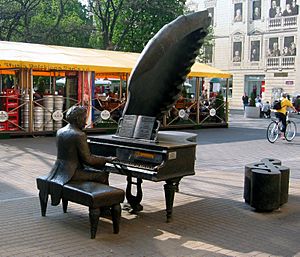
Arthur Rubinstein received many important awards and honours throughout his life, including:
- Officer of the Order of Saint James of the Sword, Portugal (1958)
- Sonning Award from Denmark (1971)
- Grand-Officer of the Order of Saint James of the Sword, Portugal (1972)
- Presidential Medal of Freedom from the US, presented by President Gerald Ford (1976)
- Honorary Knight-Commander of the Most Excellent Order of the British Empire (KBE) from Great Britain (1977)
- Kennedy Center Honors from the United States (1978)
- Grand-Officier of the National Order of the Legion of Honour of France
- Officer's Cross of the Order of Polonia Restituta of Poland
- Grand-Cross of the Order of Merit of the Italian Republic of Italy
- Member of the Civil Order of Alfonso X, the Wise of Spain
- Officier of the Order of Leopold of Belgium
- Voted into Gramophone's Hall of Fame in 2012
He also won several Grammy Awards:
- Grammy Award for Best Chamber Music Performance (1976 and 1975) for his trio recordings.
- Grammy Award for Best Instrumental Soloist Performance (without orchestra) (1978 and 1960) for his solo piano recordings.
- Grammy Lifetime Achievement Award (1994) for his contributions to music over his lifetime.
Film Appearances
- Night Song (1948)
- Arthur Rubinstein – The Love of Life (L'Amour de la vie – Artur Rubinstein, 1969)
See Also
 In Spanish: Arthur Rubinstein para niños
In Spanish: Arthur Rubinstein para niños
- List of Polish people (music)
- Rubinstein interviewed by WQXR's Abram Chasins on February 2, 1960.
 | Roy Wilkins |
 | John Lewis |
 | Linda Carol Brown |


